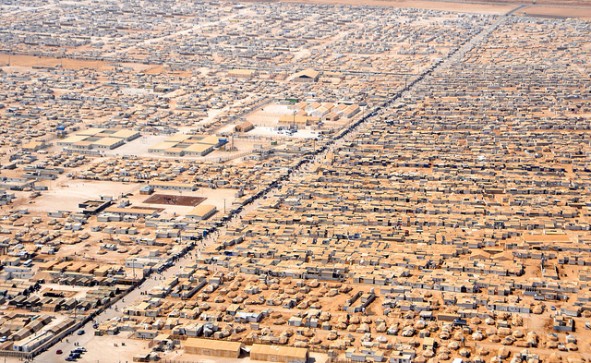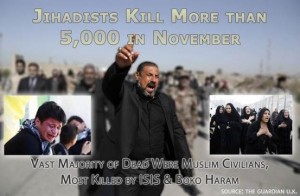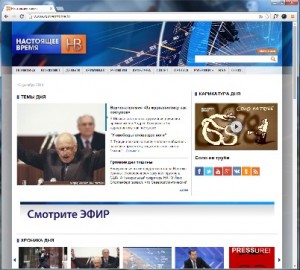 The Za'atri Syrian Refugee Camp in Jordan - Dept. of State Photo
The Za'atri Syrian Refugee Camp in Jordan - Dept. of State Photo
The Year(s) Ahead in Public Diplomacy
Forget the year ahead. Successful public diplomacy planning for 2015 must take into account 2016, 2017, 2018, and the decades to come.
In 2014, the myriad challenges the United States faces in the public diplomacy (PD) field mounted and still continue to grow. Many of them are the result of long-brewing failures of policy, and will persist without an overall strategy to mitigate them. But despite these prospects, a variety of PD efforts are being undertaken to address these challenges.

An example of the CSCC’s anti-extremist messaging.
For instance, a primary focus of Under Secretary Stengel’s PD strategy is combatting ISIL. One of the State Department’s flagship efforts is the “Think Again Turn Away” online campaign spearheaded by the @ThinkAgain_DOS Twitter account. Run by the Center for Strategic Counterterrorism Communications (CSCC), it’s aimed at discrediting and challenging extremists and their efforts to recruit online. As it is difficult for governments to wield an open internet effectively, the success of this campaign should ultimately be measured by its ability to turn the message over to more credible individuals or organizations. At a recent U.S. Advisory Commission on Public Diplomacy event, Daniel Kimmage of the CSCC indicated that the need for more credible voices to carry anti-extremist messaging is well-understood.
Further exacerbating the problem of terrorist recruiting, there are millions of refugees displaced by the Syrian conflict, and nearly a million more internal refugees in Iraq. These refugees will undoubtedly feed extremist groups for decades to come, and they are unlikely be dissuaded by online campaigns that may not be capable of reaching them. The foreign policy and public diplomacy dilemma that these refugees pose now and in the future cannot go ignored—what the United States says and does with regards to their situation will matter to the U.S. decades from now.
The public diplomacy challenges that Russia presents to U.S. foreign policy are also of a long-term nature. Yes, RT and the rest of the Russian international broadcasting budget have increased significantly in recent years, but that should not necessarily dictate the U.S. response.

Current Time is a U.S.-produced 30 minute nightly news broadcast covering the former Soviet Union.
With limited resources, the BBG is standing up efforts to challenge the narrative Russia has been propagating along its western border. This is no easy task given the concerted effort Russia is making, and more analysis is needed to determine what the best path forward is for the United States. But for now America must offer credible alternatives to biased and propagandistic Russian state media—U.S. international broadcasting should remain dedicated to the truth, and not merely the U.S. Government position.
Unfortunately, much of the hope for Russia in the post-Soviet era has been systematically quashed by Putin’s vision for the country, and it is unclear whether Russian policies will change significantly over the next several decades. Long-term strategies must be implemented if there is to be hope for any lasting change, and the U.S. will have to be serious about enacting policies which present Russia with better paths to pursue than the one it has chosen to take.
Highlighting part of the problem, in 2013/14, the number of Russian international exchange students hosted by the United States was 5,138, ranking it at 26. Comparatively, Iran, with half the population and no official diplomatic relations with the United States, had over 10,000 students in the U.S., and is ranked at 12. The United States needs to be planning for a future relationship with Russia, and the first step to that is building (and maintaining) relationships with the people who may be influential in that country decades from now. Of course, this also involves sending American students abroad—an area in which the U.S. lags seriously behind.
2015 should also be a time for introspection. The United States faces a number of problems and debates at home which undoubtedly affect the thoughts and actions of audiences abroad. The divided political situation in the U.S. has not been inspiring confidence. Issues of race remain unresolved. There are major questions about what the United States has done in pursuit of the War on Terror. Whatever these problems are, public diplomacy practitioners are faced with having to explain them, and should, without applying their personal political stance. This serves as an opportunity for the U.S. to deeply analyze its policies and determine how it wants to be seen (and reacted to) by overseas audiences, and whether or not that desire matches reality.
In summation, many of America’s current problems on the international scene require long term thinking. Under Secretary Stengel has repeatedly called for a “hardening” of America’s soft power. The hardening of that power should come in the formulation of long term comprehensive strategies designed work in conjunction with other elements of American policy to address current issues and future scenarios. It’s time for short-sighted thinking to end.






[…] Za’atri Syrian Refugee Camp in Jordan – Dept. of State Photo The Year(s) Ahead in Public Diplomacy -By Matthew Wallin on Dec 16, […]
[…] Za’atri Syrian Refugee Camp in Jordan – Dept. of State Photo The Year(s) Ahead in Public Diplomacy -By Matthew Wallin on Dec 16, […]